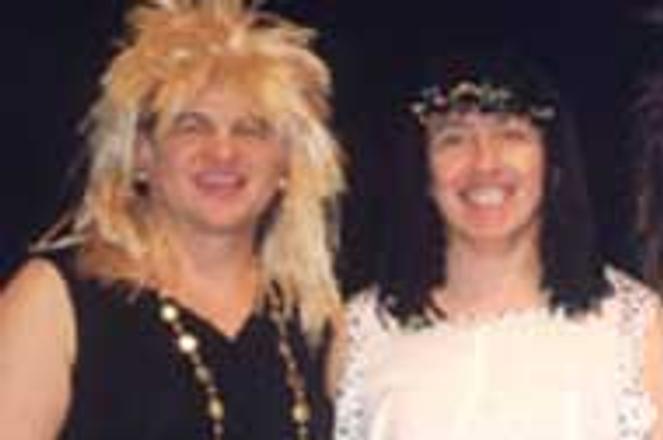The funky three: (from left) keyboard player Igor Fekete, drummer Dušan Hergott, and guitarist Peter Peschl. Senzus now performs 'just' 20 shows per month, down from 35 a few years ago.photo: Courtesy of Senzus
Sitting in his office in the basement of a Petržalka paneláky building, Peter Peschl does not look like a member of one of the most popular and best selling Slovak music groups ever. As the manager and lead-guitarist of Senzus (a three-piece folk band which parodies modern pop songs and modernises old Slovak tunes by increasing the tempo and comically altering the lyrics), Peschl looks more like a typical Slovak businessman: as his two mobile phones and fixed line ring constantly, he barks out commands to employees over the airwaves.
Established in 1978, Senzus is known by every Slovak, as well as many in the expat community (the band can often be heard on Slovak radio stations sounding as if they are drunk in a beer hall while singing the Titanic title-song to an accordion). With their hilarious versions of popular songs, the group has become a staple of the Slovak culture scene and has produced a total of 30 albums with sales of over a half million
From the very beginning, Peschl said that the group was a pure commercial venture with the aim of making a few extra crowns while playing in rowdy small town culture houses. "We wanted to make some additional money to our salaries," Peschl explained.
After several band-member changes over the years, the Senzus nucleus has remained intact since 1990, with Peschl on guitar, Dušan Hergott on drums and Igor Fekete playing keyboards. "While I'm the manager of the group, Dušan is our 'entertainer' and Igor, as an educated musician, looks after musical things [such as the song tempo, and song list]," Peschl said.
After toiling in relative obscurity through the 80's, Senzus turned the corner in 1992 when they made their first album, Slovenská rodná dedina (Slovak Native Village). "We were good before, but not many people knew about us," Peschl said. "And we were also kind of lucky, because no other band was playing the type of music we were playing when we started."
By altering traditional Slovak songs in order to appeal to people enjoying traditional music, and living in the 90's, Senzus' popularity grew by "making the songs faster and funnier," Peschl said. While similar groups are popular in German speaking countries, Peschl compared Senzus to Country musicians in North America. "Even it's a different kind of music, I think we have a very similar audience," he said.
Just as Country-music is the most popular music in the states, Senzus enjoys similar popularity here in Slovakia, frequently selling-out shows and demanding a high price for appearances: Senzus earns 25,000 Slovak crowns ($581) for a two hour concert and from 40,000 to 60,000 crowns ($930 to $1,400) for an eight-hour night performance.
Nowadays, the band plays an average of 20 shows per month, although Peschl said that as recently as 1997 the group played far more frequently. "During that time we played about 35 shows per month," he said. "It was too much. The three of us sat down together and agreed that even though we would earn more if we played more, we just wouldn't play more than 20 shows a month."
Although the band is today an attractive enough draw to fill huge sport halls, Peschl prefers playing in small villages. "It's a great atmosphere where you can feel the breath of your audience," he said. "Some people even travel 200 or 300 kilometres just to see us play."
But Peschl, who is used to giving his business card to almost ever person he meets, added that popularity hadn't come without drawbacks. "People, especially old ladies, like to call me and talk about music for a long time," he said as his phone rang for the eighth time during The Spectator's 40 minute interview. "But I have to break the talk sometimes because I also have to work."
As for the future, Peschl has no immediate plans of leaving the group. Now approaching his 50's, he "wants to play with Senzus as long as I'm fit enough to do so and as long as there are still some people interested in our entertainment."


